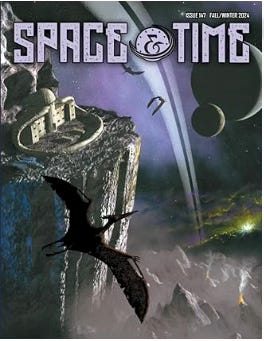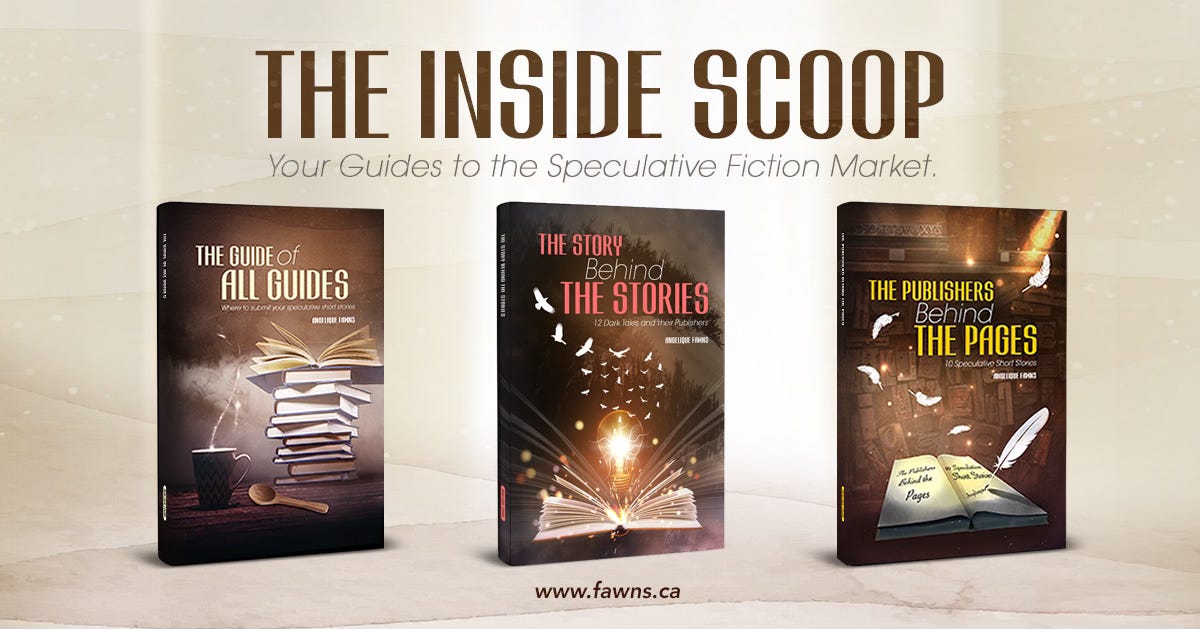Space and Time
Sci Fi -max word count 10,000, but prefer 5000 and under - Sub sims welcome - pay 1c a word
Angela Yuriko Smith is the editor-in-chief at the helm of one of the most respected magazines in the sci-fi genre. Space & Time has been putting the best speculative fiction and poetry in front of readers since 1966.
Angela Yuriko Smith, third-generation Ryukyuan-American poet, author, and publisher of Space and Time, seeks to transform our world through flywheel publishing fueled by radical generosity. A two-time Bram Stoker Award® winner and HWA President, she empowers authors, artists, and coaches to publish with intention at the Authortunities Hub, authortunitieshub.com.
Smith shares:
“As far as what we might be looking for in this next open call (to be published in October), given the current political climate in the US, I'd say stories and poems that have unification as a theme, resistance to oppression and freedom of thought will be well received. This is just my prediction. We will have to see what the First Readers, and then Final Readers think.”
The introduction of a Final Reader team is new to Space & Time. The magazine has always had a First Reader team, but now Smith has introduced a Final Reader team. She says,
“This is so the magazine ToC doesn't depend on one reader's tastes (mine). We were also lucky to have the founder of Space and Time Gordon Linzner on that team as well as the second publisher Hildy Silverman. The issue being released in April are stories selected by that Final Reader team. That being said, as the publisher I will still likely veto a story if the dog dies.... if it makes it through the First Readers.”
I really got to know Angela when she bought a story of mine for issue 147 of Space & Time. (The Fall Winter Issue of 2024). “Gragon and the Neptune Nit Infestation” is a fun and dark sci-fi story about a grumpy AI and his revenge on the messy passengers on his starship. Ps. If you are wondering how many rejections I got from Angela before she bought something from me, the answer is two. My third sub was the lucky one.
I sat down with her to get hints on how to land stories in her magazine!
AF: Being published in Space and Time is a prestigious accomplishment. Can you give us some hints as to what kind of stories are most likely to be successful?
AYS: Space and Time is a speculative magazine, but I’ve noticed each publisher has had their preferences in genre. Gordon had a lot of sword and sorcery in his issues. Hildy seemed to lean toward sci-fi and I know I have demonstrated a preference for horror stories.
Lately, however, the stories we love best are those that offer insight and solutions to what ails us in the world. Stories that deal with hunger, ecological disaster, social issues like racism and erasure… these have been rising to the top for the last few years.
Before things can be fixed someone has to imagine the solution. That’s the role of the artist whether the medium of creation is watercolor or words. We imagine a better future and it becomes possible.
AF: What do you see too much of?
AYS: Lack of formatting! I think this is something that plagues most publishers, but just taking a moment to put your manuscript into Shunn formatting and spell checking before hitting send puts a piece ahead. I see less of this in the last few years though, so I think all my winging on this topic is bearing fruit.
AF: What is your number one piece of advice for new writers?
AYS: Write your story, not the one you think someone wants you to write. When I first started writing fiction I wrote about what I loved in the form that I fell in love with it. My ghost stories read like ghost stories, which was fine, but they were competing with all the other well-crafted ghost stories that read like ghost stories. One day my friend and mentor Bryan Thao Worra pointed out to me that I wasn’t a part of my stories. I was telling other peoples’ stories. I love ghosts, but I’m also part Asian. I think technology and science are magic, and I find magic in my technology and science. I am a sucker for glowing color change, I love tattoos and if I could replace one of my eyes for a glowing red Terminator style I would.
My stories didn’t reflect me at all. I tried out Bryan’s advice and wrote “Vanilla Rice” in an hour one day for a submission call. It was my first professional sale, it’s been reprinted several times since and the books it has appeared in have won Bram Stokers and Shirley Jackson awards… not because of that story, but it was a part. Every story I’ve written since has sold, usually on the first submission.
I attribute the success to Bryan’s advice. I don’t have to be the best writer out there, I just have to write my story the best I can.
AF: If you could do something differently in your career path, would it be?
AYS: Can I say nothing? Every mistake, error and humiliation has led me to this moment and this moment is a good one for me. It’s tough to be a writer, but by luck and opportunity I have been privileged to be able to do the one thing I love best all my life, and support myself with it. If I hadn’t had the struggles, I wouldn’t know how incredibly blessed I am.
AF: How have you seen Space and Time evolve over the years?
AYS: Space and Time is an entity onto its own. The first issue is barely legible from the mimeograph printing, but to see what a high schooler created is inspiring. All I was creating in high school were marks on my permanent record. Because of Gordon and Hildy’s dedication and guidance, today that magazine attracts both established names and the yet-to-be published. When I first took over several people thought I would want to boost the magazine to professional status. I doubt I will ever find a reason to do that. I think it’s important to keep the magazine in the semi-pro level, so that writers at the beginning of their career have a place to start. I do want to raise our rates soon, but during my time we will most likely always stay in the semi-pro zone. The work submitted, however, is phenomenal. Our submissions are highly competitive, especially in recent years.
Angela is also currently running a Kickstarter to help fund a book celebrating 50 years of Space & Time.
Happy New Year fellow short story scribes! Let’s end this interview on Smith’s insightful thoughts on the role of genre fiction:
AF: What is exciting you most in genre fiction these days?
AYS: How important genre fiction is for society. Especially in the US I think we tend to overlook the importance of story (whatever medium used to communicate it) but it’s the artists that guide a society. It’s how we present things that can enlighten, connect, unite, guide… story is everything. I consider writing to be a sacred art whether we are writing genre fiction or not. As a wise supervillain once told me, “He who controls words controls the world.” As not a supervillain, I have created my own version: We who wield words guide the world to wonder.
That’s what genre fiction excels at.










I saw that too! Incredible. And here I am at 4% success.
Sold every story since?!?! Wow. Love this advice to write your own stories. It’s such a contrast from other advice we’ve seen recently in these interviews.